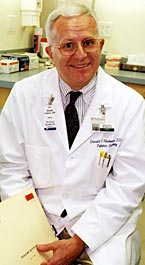


Smile Doctor
Using a double dose of medical skill and candor, Donald V. Huebener, DDS, MS, provides special-care dentistry from cradle to “graduation.”

Donald V. Huebener, DDS, MS, helps relieve the office-visit anxieties of children with special health care needs.

“Pediatric dentists are also psychologists. Patience
is their middle name and good buddy is their game.”
—Donald V. Huebener, DDS, MS
![]()
For many children, and indeed many adults, a dentist's office is a place of dread. But in the pastel-colored waiting room of Donald V. Huebener, DDS, MS, at St. Louis Children's Hospital, the mood is upbeat. Kids try out the miniature chairs and flip through pop-up books. They laugh and chatter with their parents as if they were in line for a ride at Six Flags rather than waiting to see the dentist. One teenager takes a nap in his seat.
When it is 9-year-old Sean's turn, he goes in to greet Huebener with a smile and a handshake. His mother, Dee Ann Godlewski, follows watchfully. “He's always happy to see Dr. Don,” she says, “but when the chair leans back, he gets nervous. It's only natural, after all he's been through.”
Sean was born with a cleft lip and palate, and has had 18 surgeries in his young life. But Huebener, professor of plastic and reconstructive surgery who supervises the four dental residents and two assistants in pediatric dentistry at Children's, has had plenty of experience putting children at ease during his 30 years at Washington University. He takes Sean through his checkup step by step, explaining what he is about to do and rewarding cooperation with compliments. Soon the visit is over, and Sean bounds from the chair with a big smile. “I'm done!” he booms. “Thanks!” There remains only a visit to the prize drawer, from which he selects a “stretchy alien guy.”
Not all of Sean's visits go this smoothly, but his strong relationship with Huebener has guided him over the rough spots. “Dr. Don is wonderful with kids,” says Godlewski. “When he explains firmly what has to be done, Sean will giddy up. But he also has a soft touch when it's needed.”
A cleft palate can impair a child's hearing, speaking and eating. Huebener takes time with parents, explaining what he and other physicians and dentists must do to correct problems. “At each stage he's told me: ‘After this procedure Sean will get better,' and he always does,” Godlewski says.
Serious Care for Kids
Children with serious medical conditions require complex treatment, of which dental care is an important component. Unfortunately, it is often the missing component, because there are not enough dentists who are willing and able to tackle the challenges of caring for a special needs child. According to the American Medical Association, dental care is the greatest unmet need of these children.
Lisa Burbes could not find a dentist willing to treat her infant daughter, Hope, until Huebener stepped in. Hope had a congenital heart defect which would require four surgeries by the time she was 2 years old. She also was prone to cavities. Left untreated, they could provide a reservoir for contagion that threatened to spread.
“Dental caries (tooth decay) is an infectious disease,” Huebener, professor of pediatrics, explains. “Bacteria may go through the enamel into the dentin, then into the nerve, and enter the bloodstream.” If a child has a heart defect, the bacteria may lodge there and create problems.
Hope now is 9 and has not needed surgery in five years. But she still requires vigilant dental care, because the re-routing of blood flow resulting from surgical correction also may make the heart vulnerable to bacteria. Hope doesn't mind the frequent visits. “She really likes Dr. Don,” Burbes explains as Hope selects her prize (a ring, as usual). “His whole staff is good with children.”

Infection spreading from dental caries also is a threat to children with other medical problems. Before a child can receive an organ transplant, surgeons require a clean bill of oral health from Huebener. The drugs that prevent the immune system from rejecting the transplant also lower the body's defenses against bacterial infection. Huebener's current patients include three receiving hearts and one receiving a double-lung transplant, along with a number of children receiving liver and kidney transplants.
Cancer patients need meticulous dental care before and during chemotherapy, a treatment that causes their white blood cell count to go down, thus making them vulnerable to infection. Huebener works closely with their pediatric oncologists. “Any dental care—an extraction, a filling, even a routine cleaning, has to be timed with chemotherapy,” he explains.
Huebener sympathizes with parents who come to him after a long day of trudging from one specialist's office to another.
“They're overwhelmed with their child's problems, and now they're being sent to still another doctor,” he says. He remembers one mother of a very sick boy who came in feeling exhausted, discouraged and hostile. He sat down with her. “I told her, ‘I'm here to help you in any way I can. Your son's problems are my concern.' And as we talked, all the negativity went away. Now we're the best of friends.”
Huebener believes in being completely honest with parents. He spends a lot of time with them, explaining their child's condition and discussing treatment options. Lisa Burbes, Hope's mother, notes that Huebener has spoken several times to her support group for families of children with heart defects.
Relationships with families of cleft-palate patients like Sean Godlewski become especially close because the course of treatment is long. “I had a 16-year-old in today whom I first saw as a baby,” Huebener says. “Over the years, you become a friend of the family.” Parents call frequently, seeking advice not just on medical care but on such issues as whether their child with a cleft deformity can go out for football or take up a wind instrument.
Getting past the fear
Asked the secret of his rapport with his young patients, Huebener smiles and replies: “Pediatric dentists are also psychologists. Patience is their middle name and good buddy is their game.” Contrary to popular belief, he observes, fear of the dentist is not a normal part of childhood. It arises because, all too often, parents wait until children have a mouthful of cavities to take them for their initial visit. Ideally, dental visits should begin when the first baby tooth comes in. “You build a relationship of confidence and trust, so that when you do have to give them local anesthesia for a filling, it's not the end of the world,” Huebener says.
To put the young patient at ease, he talks as he works, explaining what he is going to do and why it is necessary. In this, he emulates his own fondly remembered childhood dentist, who let him play with the “gizmos and gadgets” in the office, and who made a dental checkup an occasion to look forward to. His interest sparked, Huebener went on to attend Washington University School of Dental Medicine. The school, which closed in 1991, had a fine department of pediatric dentistry, says Huebener, and it was the chair, Patricia Parsons, DDS, who inspired him to make children his life's work.
“There's always something to look forward to,”
says Huebener, “something I haven't seen before or helped a patient
with. That's what makes my job so fascinating.” ![]()
|
“Bridging” the gap between medicine and dentistry Complex pediatric medical conditions require the care of multidisciplinary specialists, and teamwork is crucial, notes Donald V. Huebener, DDS, MS, with praise for his School of Medicine colleagues. “While, in general, medicine and dentistry have grown up apart and had separate schools of education, it's fortunate that doctors from both disciplines work together very closely at Children's,” he says. The manifold resources at St. Louis Children's Hospital and Washington University make them outstanding facilities for the very sick child. The Medical Center's Cleft Palate and Craniofacial Deformities Institute, which Huebener helped found, currently treats more than 2,200 cleft-palate patients, as well as some 1,800 children with other head deformities. The Institute brings together the many specialists needed by these patients, including plastic and oral surgeons, otolaryngologists, speech pathologists, audiologists, pediatricians, pediatric dentists, prosthodontists, orthodontists, nurses and team coordinators. Care of cleft-palate patients begins in infancy. As a plastic surgeon operates to join the upper lip, Huebener, professor of plastic and reconstructive surgery and of pediatrics, custom-tailors an appliance similar to a retainer. Inserted in the roof of the mouth, the appliance helps correctly mold and contour the palate. Further procedures are performed and other appliances installed as the child grows, sheds baby teeth and gains permanent teeth. Care usually is completed when the patient reaches the age of 19 or 20, and Huebener and his colleagues mark the occasion with a “graduation” ceremony. Children with other health problems also require specialized care. A child with epilepsy may have a seizure while in the dentist's chair, so Huebener must be ready to prevent him from hurting himself. In addition, some drugs children take to control seizures affect the central nervous system, so he must be careful about the amount of local anesthetic given for a procedure. For a child with severe hemophilia, a loose baby tooth is a potentially dangerous problem. “If you just pull the tooth, the child may start to hemorrhage, because the blood won't clot,” Huebener explains. “You have to be careful even about giving local anesthetics, because he may start to bleed from the needle stick.” In such cases, Huebener has to consult with the child's pediatric hematologist about building up the appropriate coagulation factor in the blood before he goes to work. Children with psychomotor disturbances, who are unable to stay still in the chair, may require sedation or general anesthesia, and so may very young children with extensive caries. Cerebral palsy patients also find it difficult to keep still, but Huebener has found that by holding their heads gently he often can work on them without general anesthetic. The complex medical cases he treats provide Huebener and his colleagues with the opportunity to meet unique professional challenges. But it is his deft personal touch that allows him to be both doctor and friend to his young patients. |